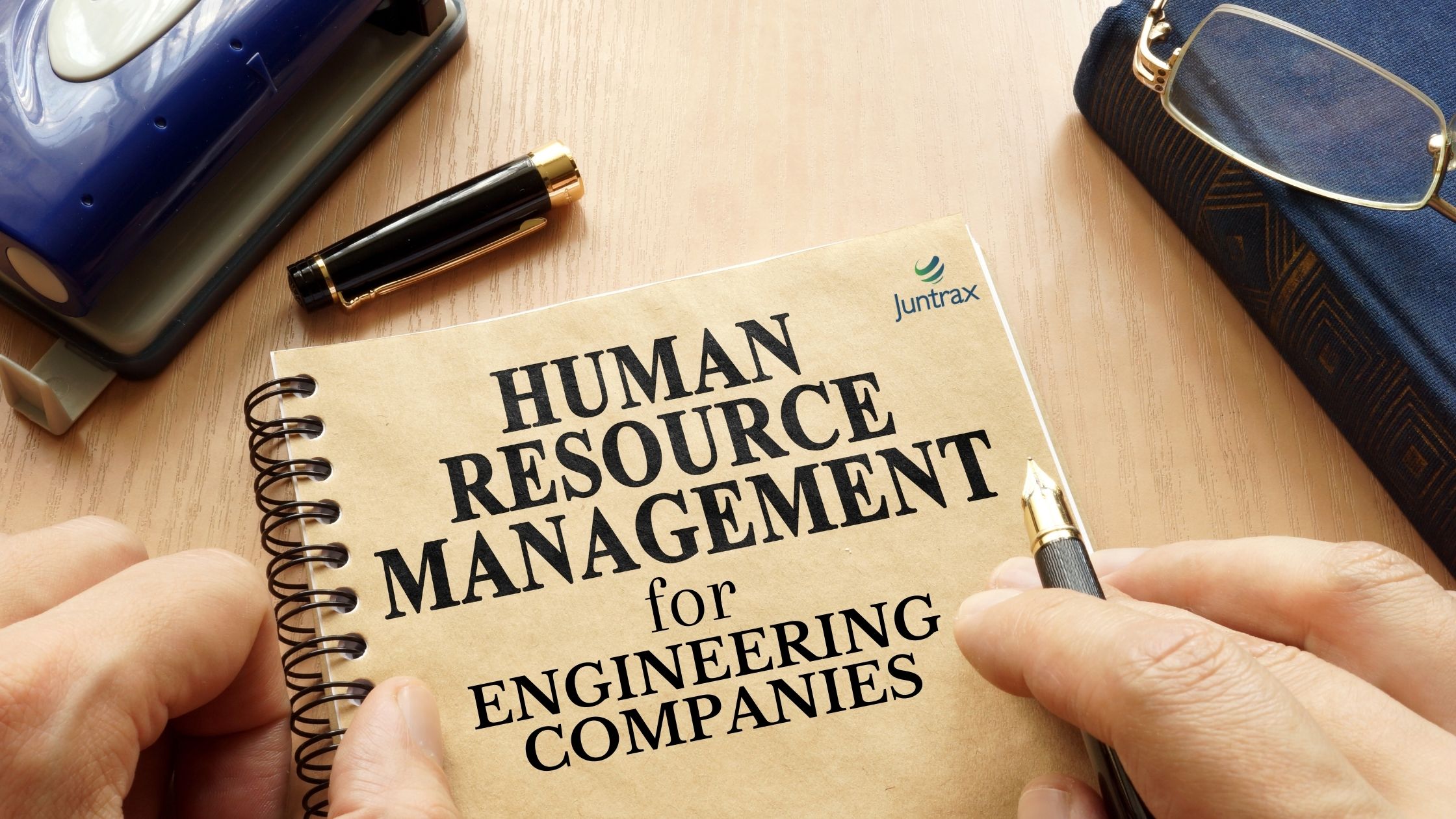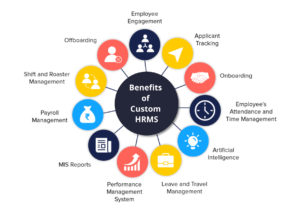Benefits of HRMS for Engineering Companies

Engineering companies face unique challenges when it comes to managing their workforce. With large teams, complex projects, and strict regulatory requirements, traditional HR processes often fall short.
This is where Human Resource Management Systems (HRMS) step in, offering you the tools to streamline operations, enhance productivity, and stay compliant.
According to recent data, 80% of businesses now utilize some form of HR software, indicating a significant shift towards digital transformation in human resources across various sectors, including engineering.
In this guide, we’ll uncover how HRMS specifically benefits engineering companies— from optimizing talent management to automating time-consuming tasks.
Discover how adopting an HRMS can lead to more efficient project execution, better resource allocation, and, ultimately, a more competitive edge in the industry.

Centralized Employee Data Management
Engineering companies often have large teams spread across multiple projects and locations. Keeping track of employee information, like qualifications, certifications, and work history, is challenging without a centralised system.
An HRMS simplifies this by organizing all personnel data in one place. It gives managers quick access to vital information such as training records, certifications, and project assignments.
Why It Matters
Engineering tasks often require specific skills and certifications. HRMS allows managers to easily track and verify that employees have the required certifications. This system ensures the workforce remains compliant with industry standards.
Moreover, it helps monitor employee performance, making it easier to align the right personnel with project needs.
Streamlined Recruitment Processes
Hiring in the engineering industry demands precision. An HRMS automates the recruitment process, making it more efficient and effective.
An HR management system simplifies each step, from job postings to candidate screening and onboarding. It can automatically post job openings on various platforms, filter resumes based on set criteria, and schedule interviews.
This saves time and ensures that only qualified candidates move forward.
Why It Matters
Engineering companies often need to fill highly specialized technical roles. Finding the right talent quickly can determine a project’s success.
A streamlined recruitment process ensures the company attracts skilled candidates without wasting time and resources.
An HR Management System also provides analytics on recruitment trends, helping HR teams refine their strategies and hire the best talent for each project.
Managing Access and Employee Self-Service
It is crucial to manage access to sensitive information and empower employees to manage their own HR-related tasks.
An HRMS allows controlled access to employee data, ensuring that only authorized personnel can view or edit information.
Additionally, it offers self-service features that allow employees to update personal information, apply for leave, track benefits, and download pay slips without going through HR staff.
For instance, HRMS software like Juntrax allows the admin to manage access limitations to various portals. There are separate portals for the admin, super admin and the employee.
These portals allow the user to navigate through different features, tools and options that fall under their jurisdiction and requirements. For example, an employee can access the clock-in and clock-out card and request changes in their attendance regulation.
Why It Matters
Employee self-service significantly reduces the administrative burden on HR departments. It enables employees to handle routine tasks themselves, leading to greater transparency and employee satisfaction.
Controlled access ensures data security, allowing only relevant personnel to access sensitive information, which is critical in industries dealing with sensitive projects or proprietary information.
Optimized Project Management and Resource Allocation
Managing multiple engineering projects at once can be overwhelming. An HRMS provides real-time insights into employee availability, skills, and current assignments.
This data helps managers allocate resources more effectively.
It ensures that the right employees, with the right skills, are assigned to the right projects. This boosts project efficiency and prevents bottlenecks caused by skill mismatches or overburdening key team members.
Why It Matters
Engineering projects often require specific expertise.
For instance, certain projects may demand employees with experience in specific types of engineering or software.
An HRMS makes it easier to match employees to tasks based on their skills and certifications. This maximizes resource utilization and ensures smooth project execution. It also prevents delays caused by poor resource planning.
Enhanced Compliance Management
Engineering companies must comply with various regulations, including safety standards, certifications, and labor laws.
Tracking compliance manually can be time-consuming and error-prone.
An HR Management System simplifies compliance management by automatically tracking certifications, training records, and regulatory requirements. It also alerts managers when certifications are due for renewal or when training is needed to meet new standards.
Why It Matters
Non-compliance can lead to costly penalties, legal issues, or even project shutdowns. An HRMS ensures that employees have the necessary certifications and that the company adheres to industry regulations.
By automating compliance tracking, companies reduce the risk of oversights and maintain a safer, more compliant workplace. This not only saves money but also improves overall operational efficiency.
Automated Payroll and Compensation Management
Handling payroll in engineering companies can be complex. Project-based work often involves varying pay rates, overtime, and performance-based bonuses.
An HRMS automates payroll management, accurately calculating salaries, overtime, bonuses, and deductions.
It ensures that employees are paid on time and that all calculations are precise, no matter the complexity.
Why It Matters
Payroll errors can lead to employee dissatisfaction and even legal disputes. An HR Management System eliminates these risks by automating the entire payroll process.
It ensures that all payments are accurate and timely, keeping employees satisfied and reducing administrative burdens.
Additionally, it simplifies financial planning by providing real-time payroll data, which helps managers make better decisions regarding project budgets and employee compensation.
Skill and Competency Management
Engineering projects demand highly specialized skills.
An HRMS helps track and maintain a comprehensive record of each employee’s skills, certifications, and competencies. This allows managers to ensure that their workforce meets the technical demands of current and upcoming projects.
The system provides real-time visibility into skill gaps, enabling companies to address them before they affect project timelines.
Why It Matters
Having the right skills on a project is crucial to success.
Without a system in place to track and update competencies, companies risk assigning underqualified employees to critical tasks. An HRMS ensures that all employees possess the necessary qualifications and certifications.
It also helps with workforce planning by identifying areas where additional training or hiring may be needed to meet future project needs.
Improved Time and Attendance Tracking
Accurately tracking employee hours is essential for engineering projects, especially long-term and time-sensitive ones. An HRMS offers integrated time-tracking tools that log working hours, project hours, and overtime.
This gives companies a clear picture of how time is spent on each project and helps ensure that employees are compensated fairly for their time.
Why It Matters
Engineering firms need precise time records for billing, cost control, and payroll purposes. An HRMS eliminates the need for manual time tracking, reducing errors and ensuring that all project hours are accounted for.
This improves cost management and ensures accurate billing for clients.
It also helps manage employee schedules more effectively, improving productivity and reducing unnecessary overtime.
Training and Development
Continuous learning is critical in the engineering industry, where technology and best practices constantly evolve. An HR Management System includes modules for managing employee training and development.
It allows companies to schedule training sessions, track completion, and ensure that employees remain up to date with the latest industry trends, safety protocols, and certifications.
Why It Matters
The engineering field is always evolving, and keeping employees updated is essential. An HRMS helps track training progress and ensures all necessary certifications are complete.
This boosts employee performance and ensures compliance with industry standards, leading to higher-quality project outcomes.
Performance and Productivity Monitoring
In engineering, tracking performance is crucial to maintaining productivity and meeting project deadlines. An HRMS allows real-time monitoring of employee performance.
It provides tools for setting goals, offering feedback, and conducting performance evaluations.
These features help companies identify top performers, manage underperformers, and motivate the team.
Why It Matters
Engineering is a results-driven field, where meeting deadlines and maintaining high-quality standards are essential. An HRMS helps companies keep track of each employee’s contribution to project goals, ensuring that performance remains high across the board.
Providing measurable insights into productivity enables managers to make data-driven decisions to improve efficiency and reward top talent.
Cost and Time Efficiency
HR functions like payroll, timekeeping, and recruitment can be time-consuming and prone to human error. An HRMS automates these processes, drastically reducing the need for manual input.
By eliminating paperwork and minimizing errors, an HR Management System helps companies save both time and money.
This leads to greater operational efficiency and allows HR teams to focus on more strategic tasks, like workforce planning and employee development.
Why It Matters
Engineering companies often operate on tight margins. Increasing efficiency while reducing administrative overhead can significantly affect overall profitability.
An HRMS provides automation and data insights that help companies streamline their operations, reduce costs, and improve project outcomes.
This allows engineering firms to focus more on innovation and less on administrative tasks.
Bottom Line
Incorporating an HRMS into your engineering company isn’t just about streamlining HR processes—it’s about enhancing overall operational efficiency, improving compliance, and empowering your workforce.
By utilizing a robust solution like Juntrax, you can seamlessly manage everything from recruitment to payroll, resource allocation, and employee performance, all while keeping your teams aligned with industry standards.
With Juntrax, you’re not just adopting an HR Management System; you’re investing in a smarter, more agile way to run your engineering business.
2 thoughts on “Benefits of HRMS for Engineering Companies”
Comments are closed.
Thanx for the effort, keep up the good work Great work, I am going to start a small Blog Engine course work using your site I hope you enjoy blogging with the popular BlogEngine.net.Thethoughts you express are really awesome. Hope you will right some more posts.
Good blog! I truly love how it is simple on my eyes and the data are well written. I am wondering how I could be notified whenever a new post has been made. I have subscribed to your feed which must do the trick! Have a great day!